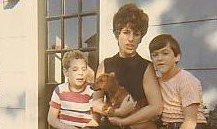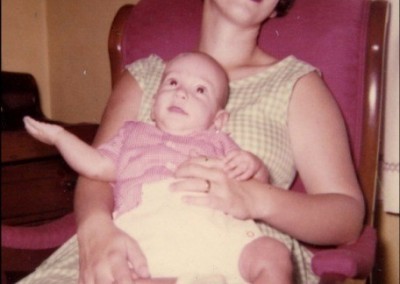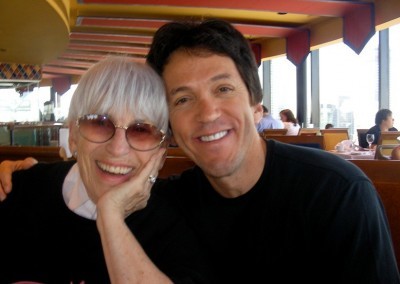Rhoda Albom
For One More Day
![]()
The Perfect Day to Finally Tell Her Story
May 8, 2005
She was born in the Depression and she was raised in Brooklyn, in a small apartment above a drugstore named Berg’s. Her father worked in a post office. Her mother stuffed $3 a week in an envelope for food money. They had no phone. They had no car. She and her school friends would hang out on the fire escapes.
“You’re going to be a doctor,” her father told her, and she believed him, because she was smart and she adored him and she believed anything he said. She didn’t believe that she was pretty, because she had kinky hair, parted in the middle, and her clothes were hand-me-downs from relatives, wool suits and plaid pants and things no young girl would want to wear.
One night, when she was a teenager, she went to a basement party. It was truly a basement, exposed pipes and a big boiler and junk furniture that some boys had collected from the trash. One of the boys wore a wet pompadour and played the clarinet, trying to impress her. She told herself, “He’s not my type.” Besides, she was going to be a doctor, like her father said.
Then one Saturday, when she was 15, the phone rang – they had one now – and a relative told her that her father had been plunging a sink, had turned to her mother and had dropped dead of a heart attack.
Her childhood was over.
Her motherhood began.
Always a caregiver
At first she was a mother to a younger brother, with whom she shared a room until her wedding. Then she was a mother to her own mother, who became depressed and needed shock treatments to deal with her grief.
In time, she married the boy with the clarinet – on Christmas Eve, in a lower east side restaurant – and after five years of sharing that same apartment with her mother, brother, and whatever other relatives were around, they finally got their own place and she became mother to her own children, three in four years.
The doctor dream was over.
“Oh, I had my hands full,” she would say. “I couldn’t think about what I missed out on.”
Instead, like many other women of her generation, she concentrated on what she had: a family. She was a strong matriarch, vocal in her love and her discipline. She kissed. She lectured. She inspired with her tenacity. Once, when her son was denied a book by a librarian who felt it was too difficult, she dragged the boy back and scolded the woman, saying, “Don’t ever keep my child from trying!”
She made her kids study. She made them breakfast dinner, and Halloween costumes. She was the one they woke at 3 a.m. after a bad dream. She was the one who said, if you have one good friend in life, count yourself lucky.
She became an interior designer, a good one, but deep down, she had a sense that life could have been more than just wallpaper and carpools and selling pretzels at the high school football games. But she put those deferred dreams into her children and she encouraged them to fly.
Always her father’s daughter
In time, they did. One moved far away. Two moved overseas. She laments having encouraged them sometimes, because she’s lonelier than she deserves to be. She has white hair now, and glasses, and she seems to be getting shorter. Some of her old argumentative fire has dissolved into quieter desires: to visit her grandchildren, to get a hug, to watch black and white movies on TV.
She still gives advice. She still tells her family to button their coats and take their vitamins. She still tells doctors as much as they tell her, perhaps because, deep down, she can hear her father’s encouragement, much as her children can hear hers.
She is like millions of mothers on this Mother’s Day, and, of course, she is one in a million to someone. In 20 years of penning this column, I have written about her husband, her youngest son, her daughter, even her uncles. But for some reason, I have never really written about her. And, true to form, she never once asked, “When do you tell my story?”
Today, Mom.
And every day of my life.
In Memory of Rhoda Albom, 1930 – 2015
![]()
Over the years in this space, I have, occasionally, written about my mother.
I once wrote a Halloween column on how she made me the Mummy. (She wrapped me in toilet paper, which was fine until it started raining.)
I wrote about how she marched me into the library after a librarian had told me “that book’s too hard for you” and my mother yelled, “Never tell a child something is too hard for him! And never THIS child!”
I wrote about how she insisted I stay in college, even when my father lost his job. How she refused to learn e-mail because she feared I would stop calling her. How I beckoned her to the stage at the Fox Theatre during a charity benefit, and a friend yelled out, “She’s in the bathroom!” … keep reading »





